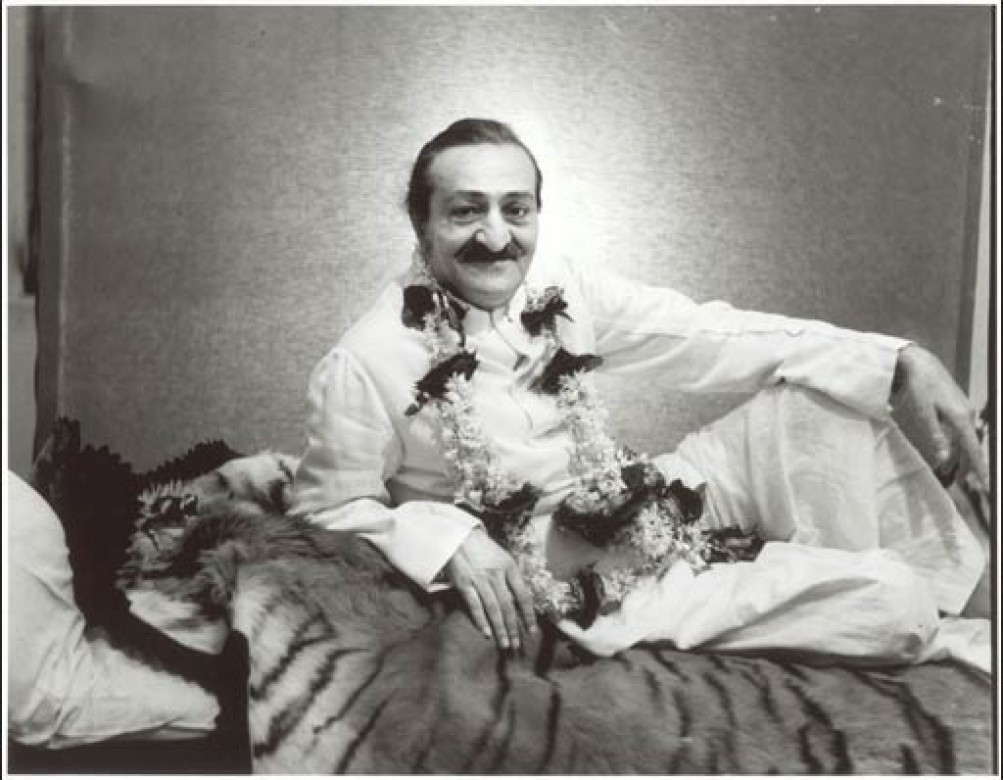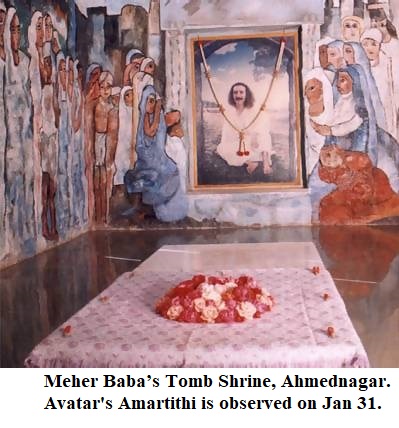Believe it or not, humans inhabit two other worlds also: Meher Baba

By Rayala Rama Chandraiah*
Contrary to popular perception, there are 18000 worlds with life, said Meher Baba in one of his discourses delivered shortly after he declared that he is the Avatar of the Age at a sleepy village in the backward Bundelkhand in the 1950s. He elaborated on the theme subsequently in his magnum opus – God Speaks, an 800 plus page tome that gives “an unparalleled exposition on the theme of God and creation and explains “how God, the sole Existence and Reality, comes to know Himself through the medium of His own dream.”
Meher Baba has another interesting take on life that lives beyond our planet earth. “Human beings inhabit earth and two worlds in the gross sphere”. According to him, the men in the three worlds do not belong to the same league. “Man on earth possesses equal degrees of 50% head and 50% heart. (but) Man on the other two worlds possesses 100% head, and 75% head plus 25% heart, respectively”. Man takes birth and rebirth on any of these three worlds. But it is only on the earth, man can fulfil his divine destiny which is god realisation, said Meher Baba, who had provided inspiration to Mahatma Gandhi for his regular tryst with silence. He himself had observed silence for close to 44 long years from 10 July 1925 till he dropped his body on the 31 day of 1969.

Meher Baba’s Amartithi (Death anniversary) is being observed at His tomb shrine near Ahmednagar this year as a virtual event by factoring the pandemic standard operating protocol.
While on other worlds, Meher Baba attributed population explosion on earth to ‘rush of migration from other worlds.’ He added that the ones migrating from the worlds of highest intelligence are ‘responsible for carrying science to the peak it has reached today’. As if addressing the sceptics, Meher Baba remarked that science would soon come ‘to know a little of what I have said’.
The main thrust of Meher Baba Ministry is against organised religion with its focus on a set of rites and rituals. “I have come not to teach but awaken (humanity to spirituality),” he used to say. He made it clear that he has nothing new to pronounce. “What is there to say? What has to be said, had been said over the ages. It was all like talking to a deaf man”.
Meher Baba was not against religion per say. His advice: “Don’t follow blindly what the religious hierarchy prescribes’. Summing up this philosophy, a noted Telugu poet composed a song that reads: “If religion is to blind my eyes, I need no religion or gelision, nor do I need any theology. Allah O Allah, we are all your children”.
Speaking about birth and death, Meher Baba termed them as illusory phenomenon. “One really dies when one is born to live in God”. “You and I are not different. I know I am God. You are yet to acquire that realisation”.
He answered two nagging questions: What is life? What is death.
“Life is that which is terminated by death”, but death is only an accident (in life). All the so-called births and deaths are only sleeping and wakings. The difference between sleep and death is that after you sleep you awake and find yourself in the same body; but after death you awake in a different body. You never die. Only the blessed ones die and become one with God,” observed Meher Baba in a discourse to his close disciples.
And elaborated thus: “Our breathing is natural and automatic. While we inhale and exhale, we have not to concentrate on it. Even in sound sleep it continues its rhyme. It is part of us. No sooner it stops, the body drops. Death is like sleep. And as sleep is essential to man, so is death a necessary part of life. In reality no one is born and no one dies. This is all a dream. The soul resides in the physical body from birth to death of human like temporary house. Death means only to mind. No death to soul or Atma.
“When death occurs, the body will be cremated. The Atma along with mind and sanskaras gathered (in the physical body) will wait in astral world to spend karmas upto approximate balance to get reincarnation. If the good and evil Sanskaras are almost balanced at the time of death, he may take on a new physical body almost immediately. He may even enter a new incarnation as early as the fourth day after death.
“When the individual is ready for reincarnation, he is automatically drawn to his future parents by his sanskaric links. The parents act as a magnet due to their previous connections with the reincarnating individual”.
According to Meher Baba, in times of wars or epidemics, when thousands of individuals may seek immediate reincarnation, it is not always possible for all to be born into families having strong previous links (with them). But if the sanskaric status of the individual is precipitating him towards incarnation, his taking on of a body is not postponed merely because parents are not available to provide a suitable previous link.
He spoke about three types of death -Normal, Abnormal, and Supernormal. Likewise, he bracketed suicide, which is a kind of abnormal death, into four grades: Lowest, Low, High, and Highest.
Normal death follows an illness, while life snuffed out during an accident/war/pandemic or due to murder or suicide is abnormal. Leaving the body voluntarily is supernormal death. This is achieved by Yogis who wind up their earthly career after fulfilling their mission. Like students who lock up their text books after passing examination.
In the lowest type of suicide, man, even after leaving the body, does not succeed in severing his link with the gross world for hundreds of years. Such individuals live literally as ghosts in the semi-subtle sphere which lies between the gross and the subtle world. They experience agonizing suffering because of their unfulfilled desires. This suffering is more acute than the intense suffering in the hell state that the individual experiences after he severs his connection with the gross world.
The ‘high’ type of suicide is in no way rooted in inferior motives and is therefore free of their deteriorating affects. It is inspired by altruistic motives alone and is a sacrifice made to secure the material or spiritual well-being of others. Death through say hunger strike, in order to better the welfare of the masses, is a suicide of this high type.
The ‘highest-grade’ results from intense desire to see god or unite with him. This is an extremely rare occurrence. If and when suicide is embraced purely for the sack of attaining the god, it can have the effect of achieving Mukti.
Turning to the ‘final moments’, Meher Baba remarked once that some people fear that they would be gripped by unbearable pain in their dying moments. “In reality, there is no need for such a fear. The process of the actual dropping of the body is quite painless”. He categorially stated that love for the dead should be selfless.
“The dead do not want your expression of sadness. Do not make them unhappy by your weeping and wailings. The joy expressed by people at the birth of a child should be expressed when a person breath his last,” said Meher Baba, adding that if you want the consciousness of their (dead) souls to progress, “express selfless love. Not a show of sorrow, grief and sympathy.”
Touching upon the last rites, Meher Baba spoke about the best post-death ritual. “The best rite is feeding either dogs or crows near the corpse, because they have subtle sight and can see the spirit of the dead person. Crows and dogs are not subtle conscious but they have subtle faculties of perception and therefore draw towards themselves the sanskaras of the dead person”.
Meher Baba is not in favour of long rituals in memory of a dead person. “No ritual or ceremony is actually necessary after 10 – 12 days of death”. (Syndicate Features)
*The writer is a long-time follower of Meher Baba. He runs a centre devoted to spreading Meher Baba’s message of love and brotherhood at his native Khammam in Telangana state.
His email: rama_chandraiah@yahoo.com
-
Book Shelf
-
 Book Review
DESTINY OF A DYSFUNCTIONAL NUCLEAR STATE
Book Review
DESTINY OF A DYSFUNCTIONAL NUCLEAR STATE
- Book ReviewChina FO Presser Where is the fountainhead of jihad?
- Book ReviewNews Pak Syndrome bedevils Indo-Bangla ties
- Book Review Understanding Vedic Equality….: Book Review
- Book Review Buddhism Made Easy: Book Review
- Book ReviewNews Elegant Summary Of Krishnamurti’s teachings
- Book Review Review: Perspectives: The Timeless Way of Wisdom
- Book ReviewNews Rituals too a world of Rhythm
- Book Review Marx After Marxism
- Book Review John Updike’s Terrorist – a review
-
-
Recent Top Post
-
 CommentariesTop Story
Palestinians at the cross- roads
CommentariesTop Story
Palestinians at the cross- roads
-
 Commentaries
While Modi professes concern for the jobless, “his government’s budget escalates class war”
Commentaries
While Modi professes concern for the jobless, “his government’s budget escalates class war”
-
 CommentariesNews
Politics of Mayhem: Narrative Slipping from Modi ….?
CommentariesNews
Politics of Mayhem: Narrative Slipping from Modi ….?
-
 Commentaries
Impasse over BRI Projects in Nepal
Commentaries
Impasse over BRI Projects in Nepal
-
 CommentariesNews
Yet another Musical Chairs in Kathmandu
CommentariesNews
Yet another Musical Chairs in Kathmandu
-
 CommentariesTop Story
Spurt in Anti-India Activities in Canada
CommentariesTop Story
Spurt in Anti-India Activities in Canada
-
 NewsTop Story
Nepal: Political Stability Under Threat Again
NewsTop Story
Nepal: Political Stability Under Threat Again
-
 NewsTop Story
Accountability Tryst With 2024 Ballot….
NewsTop Story
Accountability Tryst With 2024 Ballot….
-
 NewsTop Story
What Would “Total Victory” Mean in Gaza?
NewsTop Story
What Would “Total Victory” Mean in Gaza?
-
 CommentariesTop Story
The Occupation of Territory in War
CommentariesTop Story
The Occupation of Territory in War
-
AdSense code



















